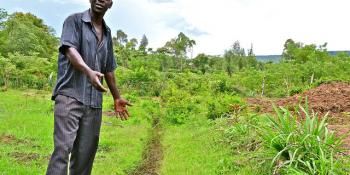The Role of Commodity Roundtables and Avoided Forest Conversion in Subnational REDD+
Halting deforestation driven by agriculture is a cornerstone of reducing GHG emissions from tropical forest countries. With demand for food estimated to increase 70% by 2050, ensuring food security while protecting carbon-rich ecosystems is a key global challenge. The Role of Commodity Roundtables and Avoided Forest Conversion in Subnational REDD+ Agriculture, Food Security & Greenhouse Gas (GHG) Accounting workshop will bring together experts from commodity roundtables, financial institutions, the commercial sector, state/province REDD+ leaders, GHG accounting and land use change, NGOs, governments, and food security to explore several different inter-locking topics.
Halting deforestation driven by agriculture is a cornerstone of reducing GHG emissions from tropical forest countries. With demand for food estimated to increase 70% by 2050, ensuring food security while protecting carbon-rich ecosystems is a key global challenge. The Role of Commodity Roundtables and Avoided Forest Conversion in Subnational REDD+ Agriculture, Food Security & Greenhouse Gas (GHG) Accounting workshop will bring together experts from commodity roundtables, financial institutions, the commercial sector, state/province REDD+ leaders, GHG accounting and land use change, NGOs, governments, and food security to explore several different inter-locking topics.
The inter-locking topics include:
- Agricultural Roundtables and REDD+: the workshop will evaluate the status of standards for land conversion prevention within the major commodity roundtables (e.g. RSB, RSPO, RTRS, etc.) and consider how these standards can complement emerging REDD+ and GHG accounting in states and provinces;
- Land-Sparing: the workshop will explore conditions under which agricultural intensification may lead to a decrease in deforestation (land-sparing). If production on existing land could meet food demand through increased yields, pressure to clear forest could be reduced but evidence of land-sparing is mixed; increasing yields also increases profits which can finance expansion. We will discuss policies, practices and mechanisms that can facilitate and promote land-sparing;
- Food Security and Reduced GHG Emissions: many of the best strategies for reducing agricultural emissions for each ton of food may also contribute to food security. The Agricultural Synergies Project was formed to develop specific technical guidance for scientifically robust ways of boosting food security while reducing GHG emissions. Examples of synergies will be discussed.
Contacts:
palola [at] nwf [dot] org (Eric Palola), National Wildlife Federation;
walkern [at] nwf [dot] org (Nathalie Walker), National Wildlife Federation;
jniles [at] tropicalforestgroup [dot] org (John O'Niles), Tropical Forest Group.


